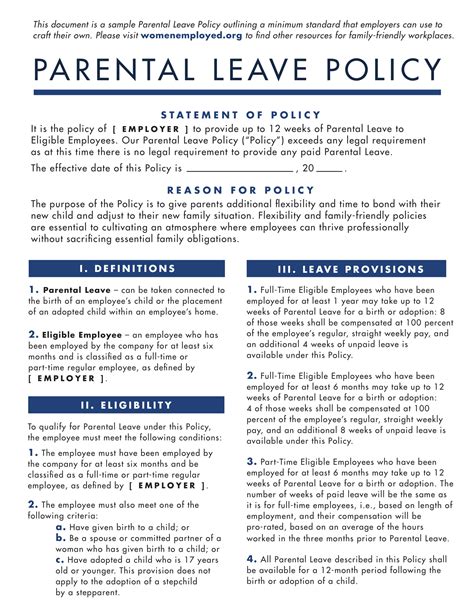Beginner's Handbook: Understanding Maternity Leave Laws

Maternity leave is a crucial time for new mothers to bond with their children and recover from childbirth. However, navigating maternity leave laws can be confusing and overwhelming for many women. In this handbook, we’ll break down the basics of maternity leave laws and provide actionable advice for new mothers.
Why Maternity Leave Matters
Maternity leave is a crucial time for new mothers to bond with their children and recover from childbirth. Research has shown that maternity leave can have many benefits for both mothers and babies, including:
- Improved mental health for mothers
- Reduced risk of postpartum depression
- Better breastfeeding outcomes
- Improved infant health and development
Understanding Maternity Leave Laws
What is Maternity Leave?
Maternity leave is a period of time that new mothers can take off from work after giving birth or adopting a child. Maternity leave is designed to give new mothers time to recover from childbirth and bond with their children without worrying about their job.
Who is Eligible for Maternity Leave?
In the United States, maternity leave is governed by the Family and Medical Leave Act (FMLA). Under the FMLA, eligible employees are entitled to up to 12 weeks of unpaid leave for the birth or adoption of a child. To be eligible for FMLA leave, employees must:
- Work for a covered employer
- Have worked for the employer for at least 12 months
- Have worked at least 1,250 hours in the previous 12 months
What are My Rights During Maternity Leave?
During maternity leave, employees are entitled to:
- Continue their health insurance coverage
- Return to the same or a similar position after their leave
- Accrue seniority and other job-related benefits
What is the Difference Between Paid and Unpaid Maternity Leave?
Some employers offer paid maternity leave as a benefit to their employees. Paid maternity leave means that employees continue to receive their regular pay while on leave. Unpaid maternity leave, on the other hand, means that employees do not receive pay while on leave.
How to Prepare for Maternity Leave
Talk to Your Employer
It’s important to talk to your employer about your maternity leave plans as early as possible. This will help ensure that your employer can make arrangements to cover your absence and that you can return to work smoothly after your leave.
Know Your Rights
Make sure you understand your rights under the FMLA and any other maternity leave laws that apply to you. This will help you advocate for yourself and ensure that your employer follows the law.
Plan Your Finances
Since maternity leave is often unpaid, it’s important to plan your finances ahead of time. Consider saving money in advance or looking into short-term disability insurance to help cover your expenses while you’re on leave.
Prepare for Childcare
If you plan to return to work after your maternity leave, it’s important to start thinking about childcare options early on. Research local daycares, nannies, or other childcare providers and make sure you have a plan in place before you return to work.
FAQs
What if my employer denies my maternity leave?
If your employer denies your maternity leave or does not follow maternity leave laws, you may have legal options. Contact a lawyer or your state’s labor department for guidance.
Can I take maternity leave if I work part-time?
Yes, part-time employees are eligible for maternity leave under the FMLA as long as they meet the other eligibility requirements.
Can I take maternity leave if I’m self-employed?
Self-employed individuals are not covered by the FMLA, but some states have their own maternity leave laws that may apply. Check with your state’s labor department or an employment lawyer to see what options are available to you.
Can I use sick time or vacation time for maternity leave?
Some employers allow employees to use sick time or vacation time for maternity leave. Check with your employer’s policies to see what options are available to you.
What if I need more than 12 weeks of maternity leave?
If you need more than 12 weeks of maternity leave, you may be able to use short-term disability insurance or other leave options. Talk to your employer or a lawyer for guidance.
Can my employer fire me while I’m on maternity leave?
No, under the FMLA, employers are not allowed to fire employees for taking maternity leave. If you believe your employer has fired you because of your maternity leave, contact a lawyer or your state’s labor department for guidance.
Maternity leave is a crucial time for new mothers and their children. By understanding your rights and preparing ahead of time, you can make sure you have a smooth and stress-free maternity leave experience.
